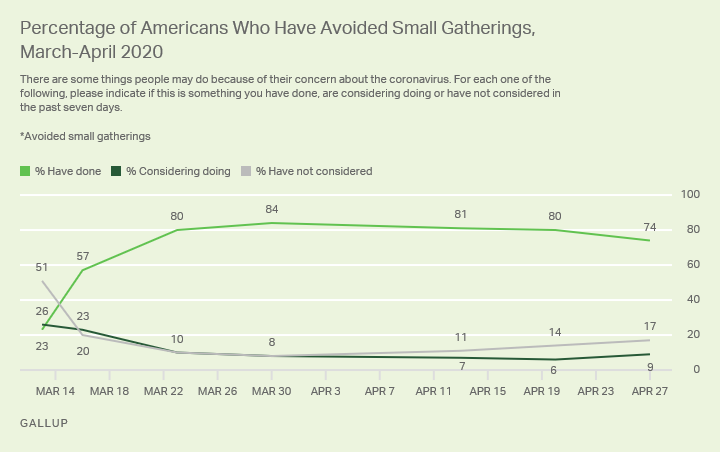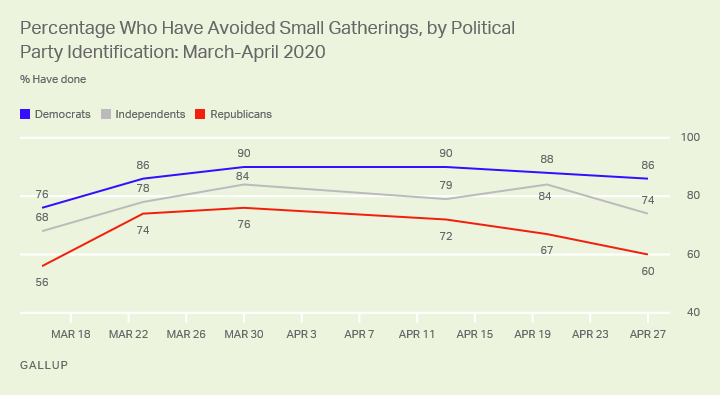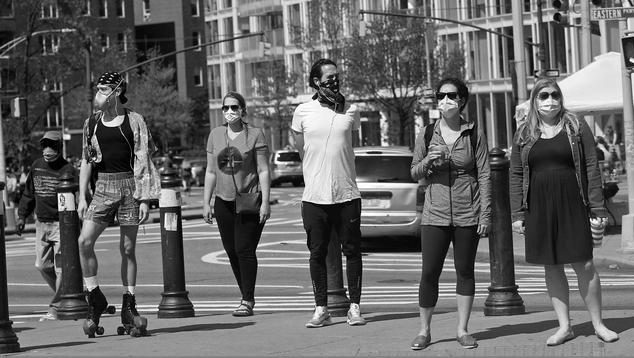Story Highlights
- Percentage avoiding small gatherings is down 10 points from late March
- Republicans have become much less likely to avoid small gatherings
- About one in six have visited someone else's home in the past 24 hours
WASHINGTON, D.C. -- Nearly three-quarters of Americans (74%) say that they have avoided small gatherings of people in the past week, but this figure has gradually declined by 10 percentage points from late-March to late-April. The decline in the percentage avoiding small gatherings has been accompanied by a similar increase in the percentage saying they haven't considered doing so, from 9% to 17%.

Even as more Americans have participated in small gatherings, they are no less likely to be avoiding public places or transportation. Additionally, three-quarters report wearing a face mask outside their home, unchanged from the prior week.
This pattern is reminiscent of the earliest weeks of social distancing when Americans were quicker to eliminate public places and transportation from their daily lives than interacting with small groups of people. Evidently, the hardest behavior to give up is also the first to return. The latest findings were collected in a probability-based sample of 4,553 U.S. adults from the Gallup Panel, interviewed by web April 27-May 3, 2020.
Dozens of states are taking steps to "reopen" their economies in varying ways, but nationwide recommendations issued by the Centers for Disease Control and Prevention on social distancing -- including "do not gather in groups" -- remain in place.
Republicans Have Become Much Less Likely to Avoid Small Gatherings
Between mid- and late-March, U.S. adults of all political stripes became more likely to say they had avoided small gatherings. But over the course of April, avoidance of small gatherings decreased among Republicans and independents.
Compared with their peaks in late-March, the 74% of independents and 60% of Republicans avoiding small gatherings are both down by double digits. The drop is particularly steep among Republicans whose 16- percentage-point decline in avoiding small gatherings nearly brings them back to the level they reported in Gallup's first measure, in mid-March.
Democrats have always been the most likely to avoid small gatherings while Republicans have been the least likely, but the 26-point gap between them is the widest yet. Independents have consistently fallen somewhere in between.

About One in Six Americans Have Visited Someone Else's Home in the Past Day
Gallup also tracks Americans' adherence to social distancing practices by asking if they have been to each of nine places in the past 24 hours, ranging from the grocery store or pharmacy to a doctor's office or other person's home.
In the past week, Americans maintained their prior avoidance of all places except for visiting someone else's home. Sixteen percent of U.S. adults last week said they had visited someone else's home or apartment, an uptick from the 11% to 13% figures Gallup has recorded since March.
Republicans (19%) and independents (18%) are more likely than Democrats (11%) to report having gone to someone else's home.
Bottom Line
There are multiple ways to social distance but avoiding small contact with people outside your household is a key recommendation by the CDC. While a strong majority of Americans report taking this action, this figure has ebbed downward over the course of the last month.
This may reflect many states' easing of restrictions as well as warming weather in parts of the country, both of which could make social gatherings more enticing to people eager to host a barbecue or take a walk with friends.
If the trend continues, it could create a larger, but dwindling, group of Americans avoiding small gatherings and a smaller, but growing, group of Americans no longer considering this kind of distance. The tension between these groups has already been evident, as viral images of unmasked social gatherings have sparked outrage and public shaming.
Projection models forecast that increases in both infections and deaths are on the way up. If this bears out in future rates, how this will impact Americans' behavior is unknown. Many have been hunkered inside for months and are tired of doing so, but another spike in cases could send some back indoors.
Learn more about how the Gallup Panel works.




